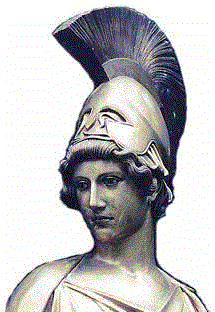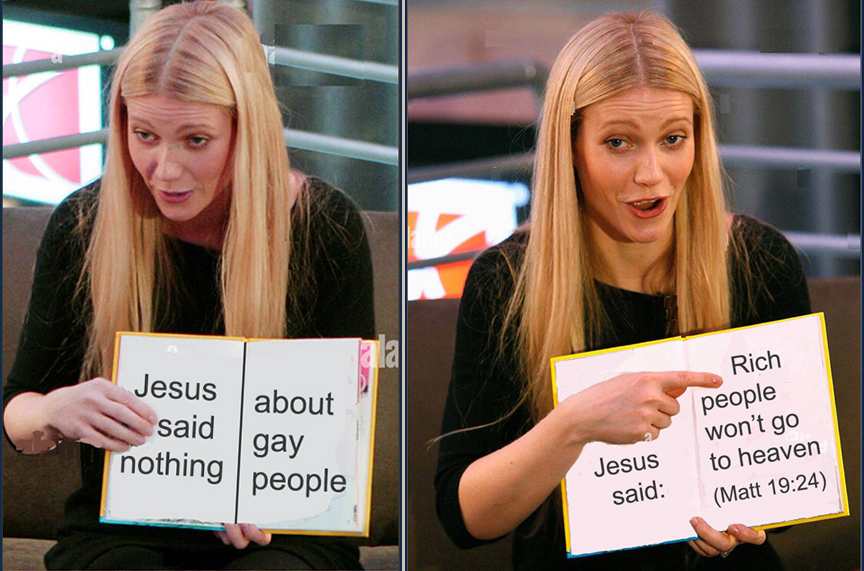

SpiritualityI am a "born Catholic," which means I was part of a Catholic family and was baptized as an infant. The advantage of that is I was already inside the club, my ticket punched, before I was old enough to think about whether I believed any of it -- which it turned out I didn't. Even as a young teenager, I knew it made no sense. And the most unbelievable part was not the idea of there being a God, but the absurd number of very specific details we supposedly knew about Him. And we were convinced we knew these things because various people (we don't know who exactly) wrote various things thousands of years ago, and then other people compiled some of that into a Bible that then got copied by hand and translated back and forth a bunch of times with ample evidence of errors and factual conflicts and mistranslations within itself and yet WE are supposed to believe this is how God wants to communicate with us today? And on top of that, we are told that God is all-powerful, yet He permits extreme human suffering to take place year after year, century after century, millennium after millennium because it is part of His Fucking Plan. (Pro Tip: If you are in the deity biz and THAT is the best plan you can come up with, you suck at your job.) So I rejected all of that, and for a long time, I had nothing specific to replace it with because we cannot know if a God exists, and we cannot know if there is an Afterlife. But we DO know that we exist right now. Whether from God or from chance evolution, here we are. We have consciousness, and we have bodies to carry around our consciousness. We don't know how long our lives will be, but we have them right now during this present moment. That is all we have and all we know. Another problem I had with the major religions was that they didn't seem to care about Nature and were too ready to pack their bags and abandon Earth altogether. It occurred to me that this was because the people who wrote the Old Testament lived in a Middle Eastern desert where the rains came once a year, if they came at all. It is no wonder that their Creation story imagined a lost Garden to explain why life was so brutal and harsh. Meanwhile, at the same time over here in lush, wet, forested North America, the native people developed a religion in which the Garden had never been lost and which they would never leave, even in death. Despite my disbelief, I kept going to mass, taking communion, crossing myself and reciting words I did not believe -- and yes, even having emotional moments when performing those rituals with other people. I decided that this was the True Church -- the people themselves -- and that we did not need God to exist in order to commune with each other in this way. When I took the bread and wine, I quietly said, "This is OUR body; this is OUR blood." 
And during much of this time, I was living with undiagnosed and untreated bipolar disorder. When I was 21, I ended up in the psych ward and finally got on the right meds to get my mood swings at least partially under control. But while I was in that hospital, I met another patient whom I will call "Fern" to respect her full privacy. Fern was my mother's age (though she looked older) and was bipolar like me, but she had self-medicated with alcohol most of her life and now had that problem too. So part of Fern's treatment was to go to daily AA meetings and do their 12-step program. But AA is a religious program, and as her first step, she needed to have a higher power. She had grown up Baptist, and their God seems to be even more of a jerk than the Catholic version, so this was a challenge for her. But the AA people said her higher power didn't have to be THAT God, nor did she have to shop around the other established religions to see if she liked THEIR God. Fern could literally MAKE UP her own higher power! Fern told me the AA people said that her higher power could be whatever or whoever she wanted, as long as it was not herself, and that it was more powerful than her. Fern decided her higher power would be her grandmother, who died when Fern was seven but was the only parental figure in her life from whom she felt unconditional love. From my perspective, her higher power still seemed to have all the powers of the traditional God, along with the mysterious plan that we should not question. Yet she seemed able to accept it now that she put it in her grandmother's form. That didn't resonate with me, but the whole idea that AA people go around inventing new deities totally blew what was left of my mind, and I thought, wait, could I do that too? Could I just . . . make up my own God? At the time, I was mainly focused on getting well enough to get out of the hospital, but that idea stuck with me, and I started thinking about what kind of higher power would work for me. I quickly decided it had to be the Earth itself. The Earth gave us life, and it sustains us with food and water -- and it gives us beautiful things like flowers and clouds and snow! If we are going to choose to worship ANYthing, why shouldn't it be the Earth? You can worship the Earth without necessarily believing it is a thinking entity conscious of itself, but I like imagining that it is. We don't know why WE have consciousness so we should not be so smugly certain that a planet teeming with life could not have it too. The fatal paradox of the Christian God is that He is supposed to be all-powerful, all-knowing and all-loving -- and yet He lets terrible shit happen constantly. Believers are then stuck with the Master Plan explanation, which for many of us ultimately becomes logically unsustainable. If we were given brains intentionally, we cannot help but use them to conclude that God might be any two of those things, but not all three. 
I like to imagine that the Earth gradually became sentient because of the abundance and variety of Life upon her -- all of which She gave birth to and continues to nourish. But "sentience" is not self-awareness, which would have developed more recently as humans, dolphins and other species began to think about more complex matters than where to find their next meal while evading predators. (In Process Theology, God is said to be evolving and changing along with us.) The Earth Goddess of my theology is not all-powerful. She can't prevent me from getting cancer or protect my house from a tornado or help me find my car keys. One might ask what good is a God that can't do those things, but I'd rather believe in a God who can't than a God who won't. You can still pray to such a God, but it is no longer transactional. You are not begging God to do something and vowing you will do something in return. You are just making a connection with the Divine and being satisfied with that. This is, of course, not an original idea, though it came to me before I realized others had it long before me. The Goddess of Earth was called Gaia by the Greeks, but then they cluttered up their theology with a bunch of dude gods. Not surprisingly, the male writers of these ancient stories either ignored Gaia or turned her into a vengeful bitch god who sent bad weather. Other ancient people had other names and mythologies, but actual belief in a Goddess of Earth has mostly been lost as Humanity decided it wanted gods that did not just help the crops grow but could also defeat their enemies in battle. My point is that the official religions are no more credible than anything you can come up with for yourself. While you are alive on this Earth, you will never know for certain who or what God is, whether God exists at all, and you certainly don't know what God thinks about anything. You can only guess. And my guess is that whatever ritual you may perform on your Sabbath probably matters less than how you live your life and how you treat others -- especially those who are weaker or poorer than you. If there is actually a powerful God watching us, and if that God is good (which is not a given), and if that God judges us after we die, then it stands to reason that such a God would judge us based on how we lived the life we were given, whether we made the lives of others better or worse, rather than whether we performed a certain ritual or worshiped God in a particular way. So in conclusion, class, we have established that:
PrayerI envision "The Spirit" as being a field of energy enveloping the earth through which the Goddess and her many children can sense the presence of each other and potentially communicate at some level.  When someone we care about is in distress, we instinctively pray for them, whether we believe in God or not -- but what do we think is actually happening there? Within the Judeo-Christian belief system, we are supplicating to an all-powerful deity who already knows what the problem is and who has the power to instantly put things right. Sometimes it seems like He answers a prayer; other times not. Either way, we tell ourselves it was His Will, but if that is the case then what was the point of our prayer? Did it matter whether we prayed or not? I have started thinking of prayer differently and in a way in which it could potentially matter. Doctors say that a patient's positive attitude can sometimes help with healing. Not always, of course, but sometimes. I read about a study by the Mayo Clinic that listed a dozen or more health situations (heart disease, stroke, even cancer) in which a patient's attitude can reduce the risk of getting sick as well as improve recovery. When you visit someone in the hospital and hold her hand, you can help her focus her positive energy on healing. But what if you are not in the same room, or she is unconscious? Can your positive thoughts -- your prayers -- still connect with her? My atheist friends are rolling their eyes because they will tell me, there is no scientific evidence of this, and it does not fit into any of the ways that we perceive reality. I'm not 100% sure I believe it myself, but just because we have our specific five senses does not mean there are no other ways reality might be perceived. Dogs can tell if a person has cancer, and some people with severe autism exhibit "savant" abilities such as those depicted in the movie "Rain Man." There are ancient forests where the roots are connected and a sick tree receives a healing boost from the others. So I am not willing to accept that it is absolutely impossible for my own mental energy to reach someone else who is not physically close by. Within my still-evolving theology (which I admit I made up, just as all theologies are made up), I imagine an energy field that we have not yet scientifically identified -- much like other fields and forces that we did not know existed until we discovered them. Before Marie Curie's work 100 years ago, we did not know there was such a thing as radioactivity -- which would have sounded like a crazy idea if you tried to describe it to someone before that time. 
We are AthenaIn my theology of The Spirit, I often picture a "messenger" like Athena in Homer's epics. She would swoosh down from Mount Olympus to help Odysseus and the Akhaians, but she never showed herself to them as her true self. Instead, she'd be in the form of a washerwoman or an old soldier or some other ordinary person who just happened to be in the right place at the right time to say or do just the right thing to help Odysseus. This is related to the concept of Serendipity, which different people define differently. To some, it means "only coincidence and nothing else," while to others (including me) it means "coincidence and also something else." I believe that all life is connected, like the roots of that ancient forest. It's not like the healthy trees "decide" to help the sickly one because, you know, they're still just trees. But the connection happens automatically without that decision. We sometimes decide to do a certain thing, but other times we just happen to be in a particular place at a particular moment, and perhaps The Spirit led us there. Sometimes in our lives, something good happens -- we find a treasure thought to have been forever lost, or perhaps a stranger out of the blue says or does just the right thing that helps us out in some way that they did not necessarily intend. Maybe those things just randomly happened, or maybe something we can't see helped them along. Lots of people think "God" intervenes in this way. I like to imagine it as The Spirit. But The Spirit is not all-powerful as God is supposed to be. He can just snap his fingers, and whatever you need fixed can be fixed . . . if He feels like it -- which apparently He usually does not. So He will just let you suffer, even though He could easily help. He claims to care, but apparently, He just does not care enough. When someone you love is suffering -- even your cat -- you will do whatever you possibly can to alleviate that suffering. But you care about your cat more than God cares about you. The Spirit can't snap Her fingers and do whatever She wants. She can only reach out and nudge someone to feel a little more positive and heal a little faster. She may give you the idea to drive home a different way today, a route that takes you right past that person in need, and She will be sitting beside you in the passenger seat, and She will say to you, "That person looks like they need help." Prayer can be a way for us to focus our energy in The Spirit and sometimes help each other in that way. Sometimes, a person is really in need. Maybe they pray for help, or somebody they know prays for them. Maybe there is no prayer at all, but The Spirit still feels their distress and is moved to help them. And when The Spirit is moved, that means we are ALL moved. And maybe at that moment I am standing right next to that person at a streetlight downtown, and my mind is busy thinking about the errand I am on but then I feel inside myself what The Spirit feels -- because The Spirit is in all of us -- and I look around me and I see that person I might not have noticed right there next to me, and now I can tell that something is wrong and I say, "can I help you?" And when that happens, I am Athena. I am the messenger from God who has come to help. Sometimes I am Athena, and sometimes I desperately need Athena to come to me -- and She has. I remember a homily in which the priest told us he said to God, "Why don't you do something about all the suffering in the world?" And God replied, "I did do something. I put you here." Of course, the "we are God's hands" argument is not very satisfying when we are talking about natural disasters and children with cancer. What we humans can do is limited, but we could be doing a fuck of a lot more than we do. It would be swell if we had a loving, all-powerful God who answered prayers and protected us from harm. But we don't have that God. That God obviously does not exist. But we do have The Spirit, and for what it's worth, we have these hands.
Today is a GiftI have a lot of little things taped to the frame of my computer monitor. In fact I have lots of little things I cut out stuck all over the house. I have a whole wall here in my special room where I have made a collage of cool faces I cut out of magazines. This is "my" room in the house where I have my computer and my art desk and all my goofy arty stuff. Mona never touches any of it and she is so respectful of every little scrap because she knows I have a Reason for everything in this room. But anyways, the particular thing taped to my computer that I was gonna mention says this: "Today is a Gift - What will you do with it?" That is just something I wrote down one day and taped to my monitor. Uh, but I also wrote down and taped up here “You have no idea how head my full is!” But seriously, I am almost constantly aware of the Gift of Today. From talking to other people I realize this is not all that common. People are busy with their jobs and their errands and so on and forget to Be Here Now. It has become cliche, I know, but as a modern-day person trying to talk about theology has said, "all the good words are taken." What the Bible says about homosexualityWell, heck, anyone knows that, right? The Bible sez we're "an abomination." In several places. Interestingly, though, there are a LOT of other things in the Bible that most Christians ignore. For example, some people love to quote Leviticus 18:22 about homosexuality but they ignore the entire rest of the book which prohibits having tattoos, eating pork and shellfish, the wearing of a garment made of two types of cloth, planting two types of seed in the same field and dozens of other things that modern-day Christians ignore. Leviticus also explains in great detail how to buy and sell slaves in a manner that clearly does not condemn slavery. (Leviticus 25:44-46) Granted, there are a couple of anti-gay passages are in the New Testament also, mostly in the letters of Paul, who was a busybody with an opinion about EVERYthing. But he issued edicts and orders on a lot of other things that Christians choose to ignore. For example, in I Corinthians 11:5-6 Paul says women must cover their headsin church and never cut their hair. And then a few chapters later, in I Corinthians 14: 34-35, Paul writes: "Women are to remain quiet in the assemblies, since they have no permission to speak: theirs is a subordinate part, as the Law itself says. If there isanything they want to know, they should ask their husbands at home: it isshameful for a woman to speak in the assembly." Most Christian women don't keep their mouths shut in church -- and I'm certainly not saying they should. But if they're gonna harp to me about what the Bible says about gays, then they'd best shut their traps in church cause the Bible says that too. You'd think that people who consider Jesus their Lord and personal savior would value HIS words above all others -- and in many Bibles the words of Jesus are illuminated in red. In those red letters, Jesus himself is never quoted saying anything against homosexuality, but he is loud and clear about divorce for example. In Matthew 5:32 Jesus says "whosoever shall marry her that is divorced committeth adultery." Most Protestant churches accept divorce and re-marriage and you never hear them pointing to this passage and condemning divorce. Yet they sure like those anti-gay sections. He is also pretty explicit on the topic of wealth and is quoted in three separate gospels saying "it is easier for a camel to pass through the eye of a needle than for a rich man to enter the Kingdom of God." (Matthew 19:24, Mark 10:25, Luke 18:25) Here is a little parable that I made up to illustrate the hypocrisy of conservative Christians on these topics:

|
